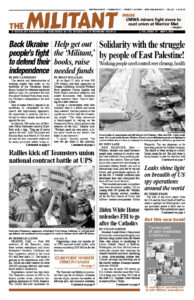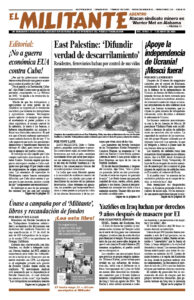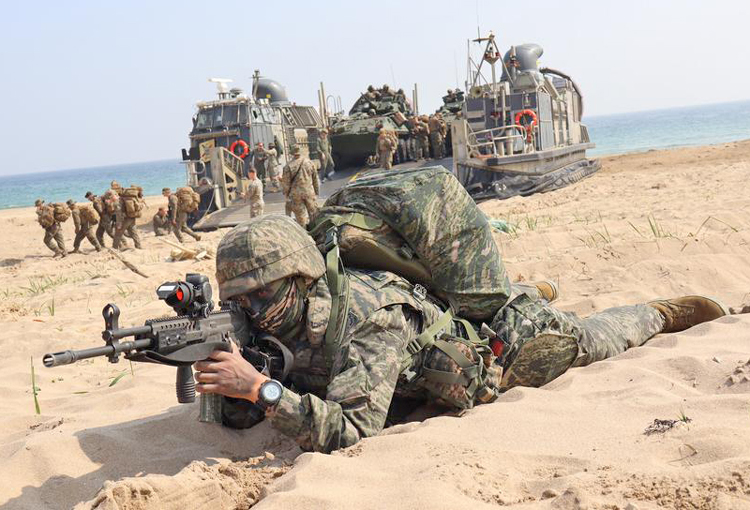Washington, Seoul, and Tokyo have been carrying out a series of overlapping and provocative war games in South Korea aimed at intimidating the Democratic People’s Republic of Korea in the North. They are the largest military maneuvers there since 2018 when the U.S. government scaled back the annual “exercises” as part of talks between then-President Donald Trump with North Korean leader Kim Jong Un.
Those talks — which pointed toward the denuclearization of the Korean Peninsula — stalled in the face of Washington’s refusal to end economic, financial and trade sanctions against North Korea and its refusal to pledge to never invade the North.
Amid the talks with Trump, the government of the DPRK had dismantled some of its nuclear facilities and had not conducted a test of nuclear weapons since 2017.
At the end of World War II, following the defeat of the Japanese rulers — who had brutally occupied Korea since 1910 — the peninsula was divided into North and South by Washington, with the connivance of the Stalinist regime in Moscow, against the will of the Korean people. The U.S. Army occupied the South and by 1948 installed the bloody dictatorship of Syngman Rhee, who put down popular mobilizations in blood.
In the North, workers and farmers began organizing to carry out a land reform, expropriation of capitalist businesses and measures to guarantee equal rights for women.
Then in 1950 Washington provoked the Korean War. North Korean soldiers and guerrilla fighters nearly succeeded in pushing the U.S. occupation troops out of the country, but Washington counterattacked, using massive carpet bombing and napalm in the North, reaching almost to the Chinese border before being forced back.
The war ended in a stalemate in 1953, the first defeat ever for U.S. imperialism. More than 4 million people were killed and the U.S. had reduced northern Korean cities — and a good part of the South — to rubble. Washington signed an armistice, but to this day has refused to sign a permanent peace treaty.
There are 28,500 U.S. troops stationed in South Korea today.
Biden restarts war games
Under the Joseph Biden administration, Washington has escalated provocative annual joint military drills that mimic attacks on the North. In November, Washington and Seoul held a joint air exercise “Vigilant Storm,” which carried out 1,600 sorties with 240 warplanes.
The largest of the U.S.-South Korean joint maneuvers, the two-week “Ssangyong (Double Dragons) Exercise,” ran from March 20 to April 3. Conducted at sites around the peninsula, it involved some 9,500 U.S. Marines and sailors and 3,000 of their South Korean counterparts, as well as 30 British Royal Marines. This included the nuclear-powered aircraft carrier USS Nimitz, with its accompanying strike group of smaller ships and planes.
The four-day U.S.-South Korean “Warrior Shield” exercise, which ended March 23, included live-fire artillery drills and some 1,200 troops as close as 16 miles from the Demilitarized Zone.
In a separate naval exercise April 3, the Nimitz Strike Group and South Korean destroyers were joined by Japan’s JS Umigiri destroyer near Jeju Island to practice underwater targeting of North Korean submarines, drones and torpedoes.
On April 14, two B-52 Stratofortress bombers — which are capable of launching nuclear bombs — several South Korean warplanes and four Japan Air Self-Defense Force F-15 fighters flew over the East Sea, a day after North Korea conducted a successful test of a solid-fuel intercontinental ballistic missile.
Ri Pyong Chol, vice president of the North Korean Workers Party’s Central Military Commission, issued a statement calling the deployment of the B-52 bombers “clear evidence that the U.S. nuclear threat and blackmail against us has reached a level that cannot be overlooked.”
SWP champions reunifying Korea
We continue to “champion the fight to reunify Korea,” Steve Clark wrote for the National Committee of the Socialist Workers Party in a letter to the leadership of the Democratic People’s Republic of Korea to commemorate their April 15 national holiday. He noted that some of the latest U.S. sea maneuvers “were carried out off the coast of Jeju Island, where almost seventy-five years ago the US rulers were complicit in the massacre of up to 30,000 working people rebelling against the proimperialist regime imposed on South Korea.”
“The Socialist Workers Party demands that the US government immediately and unconditionally cancel all joint military exercises with Seoul, Tokyo, and other capitalist powers,” Clark said. “Withdraw US military personnel and weaponry from Korea. Lift all sanctions against the DPRK. Sign a peace treaty ending the decades-long state of war by the US imperialist government. Reopen talks to end the deployment in Korea and its skies and waters of nuclear weapons and delivery systems by all sides.
“Support for Korea’s national sovereignty and unification can be won among toilers and others in the US and worldwide.”


